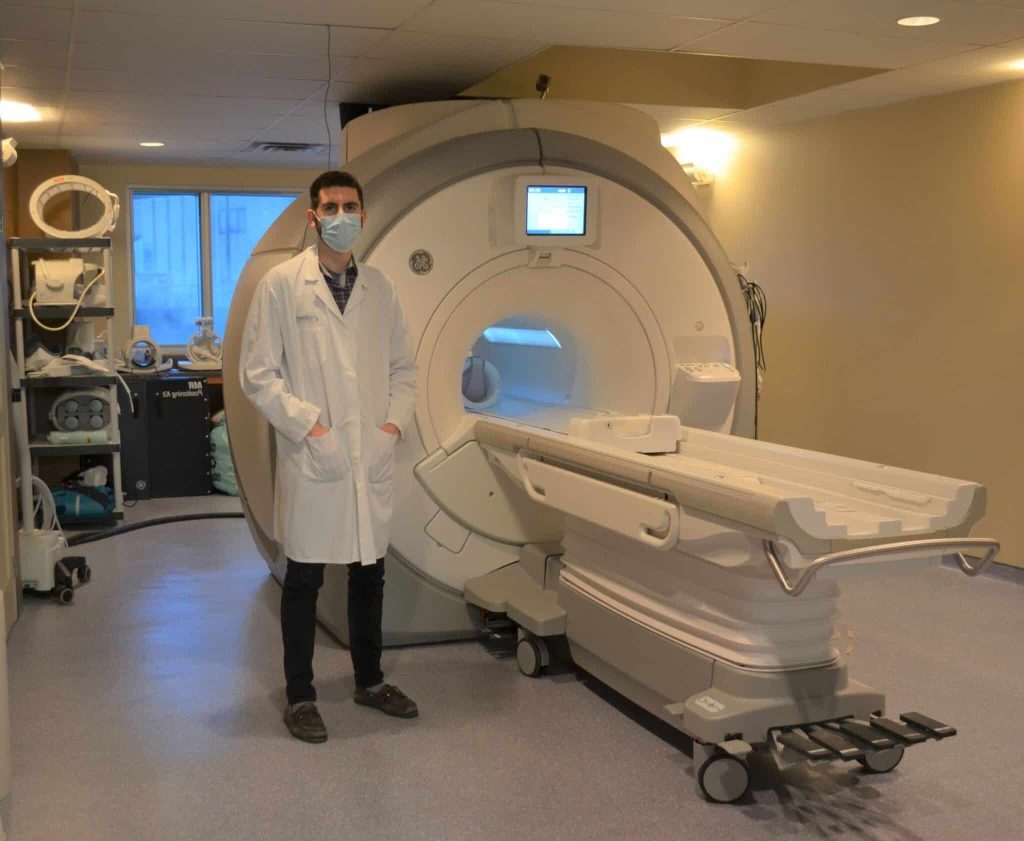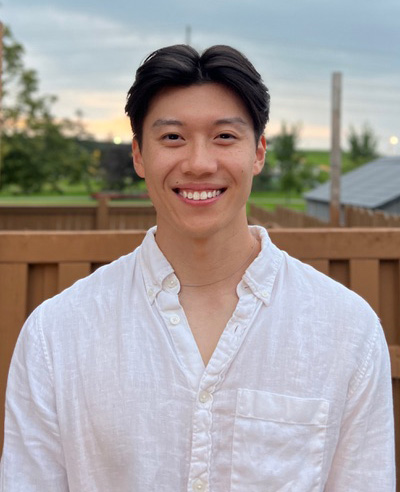The contributions of our donors continue to fund the Breast Cancer Society of Canada Translational Research Unit (BCSC-TRU) at the London Health Sciences Centre (LHSC).
We would like to acknowledge the Margaret Rothweiler Charitable Foundation for their continued support and grants towards this research.
The goal of the BCSC-TRU is to foster translational, patient-centred breast cancer research in multiple disciplines throughout London, Ontario. Under Dr. Alison Allan’s leadership, the BCSC-TRU supports research specifically focused on the understanding, prevention, tracking and/or treatment of metastasis, the deadliest aspect of breast cancer.
The BCSC provides valuable support for three major programs within the Unit (2021-2022):
- Translational Breast Cancer Research Traineeship Program – $125,000
- Senior Breast Cancer Research Scientist Program – $75,000
- Translational Breast Cancer Research Catalyst Grant Program – $50,000
Translational Breast Cancer Research Traineeship Program
This program supports the best and brightest graduate students, postdoctoral fellows, and clinical research fellows working on patient-centred breast cancer research in different scientific disciplines across the city of London. The goal of the program is to provide the very best training possible for the next generation of breast cancer researchers such that they learn how to work on collaborative teams focused on research that makes the greatest impact on improving the outcome of breast cancer in Canada.
Research projects must have a focus on the understanding, prevention, tracking and/or treatment of breast cancer; and must involve collaboration of both basic science and clinical investigators. Trainees are rigorously evaluated and selected for awards based on their outstanding academic accomplishments, their research experience/potential, the scientific quality of the project, and the translational relevance of the research and applicability to metastatic breast cancer.
2021-2022 Breast Cancer Society of Canada Scholarship/Fellowship Recipients and their Research Projects
In August 2021, we announced the new Breast Cancer Society of Canada scholarship/ fellowship recipients for the 2021-2022 academic year, which included two MSc students, four PhD students, one postdoctoral fellow and one clinical fellow who were selected for awards. One of the MSc students, Britney Messam, was able to leverage BCSC funding and received a larger external scholarship, resulting in these her studentship funds coming back into the program to support additional students next year. Another MSc student, Sean McRae, has expanded his breast cancer research as a result of BCSC support and successfully transferred to the PhD program. The seven currently funded trainees are enrolled in five different academic departments/programs at Western including Oncology, Anatomy & Cell Biology, Biochemistry, Medical Biophysics, and Pathology & Laboratory Medicine. The trainees are working in research laboratories located at the London Health Sciences Centre, St. Joseph’s Health Care, Robarts, and Western.
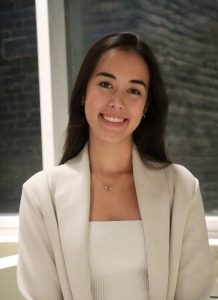 |
Monique Morin is an MSc student in the Department of Pathology & Laboratory Medicine, under the co-supervision of Dr. Muriel Brackstone and Dr. Jeremy Burton. Her research focuses on characterizing the breast microbiome in women at high risk of breast cancer and subsequently modifying it with probiotics. The goal is to see if harmful bacteria in the breast can be replaced with “healthy” bacteria to reduce inflammation in the breast tissue, a major contributor to the morbidity of breast cancer. Linking abnormal microbiota in breast tissue to breast cancer risk could contribute to improved early diagnosis and therapy. |
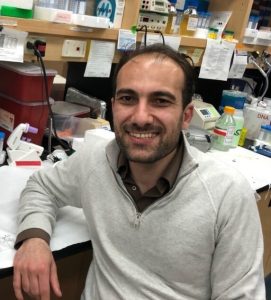 |
Rober Abdo is a PhD student in the Department of Pathology & Laboratory Medicine, under the co-supervision of Dr. Qi Zhang and Dr. Shawn Li. His project focuses on molecular profiling of breast cancer brain metastases. He will study samples from breast cancer patients with brain metastases to identify changes in the cancer cells that allow the cells to spread, evade brain defense mechanisms, and flourish in the brain microenvironment, using cutting-edge techniques known as NanoString Digital Spatial Profiling and mass spectrometry. Rober hopes that his work will identify critical changes that may serve as targets for the future treatment of breast cancer brain metastasis. |
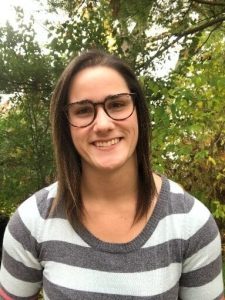 |
Sawyer Badiuk is a PhD student in the Department of Medical Biophysics, under the co-supervision of Dr. Eugene Wong and Dr. Jeff Chen. Sawyer studies the effectiveness of radiation therapy treatments for breast cancer that has spread to the brain using novel imaging techniques. Her research involves monitoring the response of the brain and cancer cells after treatment, to find an optimal radiation treatment that controls the cancer while also reducing side effects. The overall goal of her research is to prevent new and recurring brain metastases. |
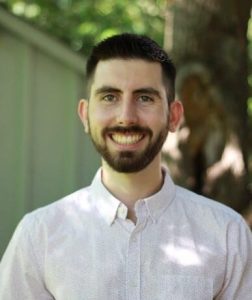 |
Sean McRae is a PhD student in the Department of Medical Biophysics, under the co-supervision of Dr. Timothy Scholl and Dr. John Ronald. Sean is working on developing tools to track the spread of breast cancer from the primary tumor site in pre-clinical animal models. By engineering cancer cells to express a transporter, cells are able to take up an administered contrast agent that increases their visibility relative to surrounding tissue on magnetic resonance imaging (MRI). Sean is working on developing new and improved contrast agents that will further improve our ability to study the spread of breast cancer in patients. |
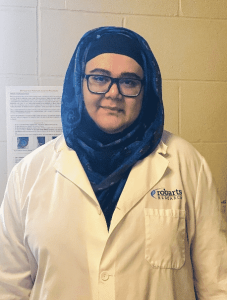 |
Tasnim Reza is a PhD student in the Department of Biochemistry, under the supervision of Dr. Michael Boffa. Her research focuses on the anti-metastatic and anti-angiogenic role of two proteins called thrombin activatable fibrinolysis inhibitor (TAFI) and thrombomodulin in breast cancer. Her research will encompass the mechanistic study of breast cancer cells and their response to a protein drug based on thrombomodulin in test tubes and animal models. Tasnim hopes that the results obtained through this research will allow future translation of a novel anti-metastatic therapy into the clinic to benefit breast cancer patients. |
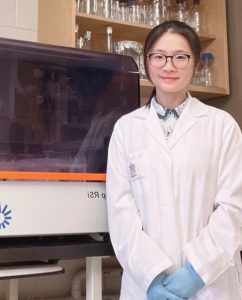 |
Shanshan (Jenny) Zhong is a PhD student in the Department of Biochemistry, under the supervision of Dr. Shawn Li. She is currently developing a series of inhibitors for breast cancer immunotherapy and evaluating their therapeutic potential using animal models of breast cancer. It is commonly believed that immune cells such as T cells can effectively inhibit the growth of breast cancer, and a protein called PD-1 expressed on T cells can turn off immune responses. The inhibitors that Jenny is working on are able to block PD-1 signaling and restore the immunity against breast cancer. Her project will offer novel approaches for breast cancer therapy and also lead to a better understanding of PD-1 signaling in metastatic breast cancer. |
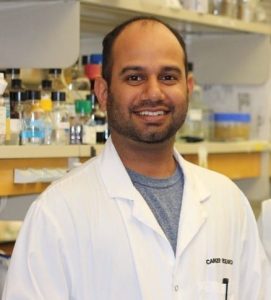 |
Dr. Vasudeva Bhat is a Postdoctoral Fellow in the Department of Anatomy & Cell Biology, under the co-supervision of Dr. Alison Allan and Dr. David Palma. His project focuses on investigating the potentially paradigm-shifting concept that breast cancer patients with “oligometastasis” may represent a treatable (and potentially curable) subset of patients. Oligometastasis refers to a disease stage where the cancer has spread beyond the breast but is not yet widely metastatic. The goal of this project is to develop and validate a multi-biomarker approach for defining the oligometastatic state in breast cancer using minimally invasive blood tests (“liquid biopsies”). Vasu is carrying out combined assessment of circulating tumor cells, circulating tumor DNA, and host immune cells. He will then compare these biomarkers to patient survival and disease progression following radiation treatment in order to develop a prognostic/predictive blood-based multi-biomarker panel. |
 |
Dr. Diana Paola Arteaga is a Clinical Fellow in the Department of Oncology, under the supervision of Dr. Ana Lohmann. Her project aims to bridge the gap between the detection of circulating tumor DNA in patients with suspected metastatic breast cancer and its clinical use. The goal of this approach is to replace tissue biopsy with minimally invasive techniques such as a simple blood test. This approach may also provide important information to clinicians confirming diagnosis and guiding treatment decisions in breast cancer patients. |
Senior Breast Cancer Research Scientist Program
The BCSC supports an outstanding Senior Breast Cancer Research Scientist within the TBCRU, and her expertise and research accomplishments are described below.
Dr. Alison Allan is a Senior Oncology Scientist and the Director of the TBCRU. Her translational research program is focused on cellular and molecular mechanisms of breast cancer metastasis; in particular the study of cancer stem cells (CSCs), circulating tumor cells (CTCs), and the lung microenvironment, and how the knowledge gained from experimental studies in these areas can be translated to the clinic to benefit patients.
Dr. Allan is a Canadian leader in the development and validation of CTC blood tests to track metastasis and has worked closely with the Canadian Cancer Trials Group to move this research into the clinic to benefit breast cancer patients. In 2013, Dr. Allan established a partnership with Janssen Oncology and Laboratory Services at the London Health Science Centre (LHSC) to translate her blood test expertise and instrumentation into the clinical hematology lab setting in order to make this test available to patients and clinicians throughout Canada– making LHSC the first academic hospital in Canada to offer this testing to patients.
Translational Breast Cancer Research Catalyst Grant Program
The Translational Breast Cancer Research Catalyst Grant Program is a rigorous, peer-reviewed program that provides “seed funding” to develop the most promising new breast cancer research ideas in London. Two of these highly competitive grants are given out in the Fall of each year and are intended to either kickstart new research ideas that lead to improvement in breast cancer prevention, diagnosis, and treatment; and/or provide critical bridge funding to move research towards the clinic.
Updates from the 2021-2022 Catalyst Grants:
The recipients of Catalyst Grants this year include Dr. Armen Parsyan and his project “Identification and Validation of Novel Genes Associated with Radiation
Resistance in Triple Negative Breast Cancer Based on CRISPR-Cas9 Genome-Wide Knockout Screening”; and Dr. Matthew Hebb and his project “A novel breast cancer brain metastasis PDX rat model for the evaluation of an experimental electrotherapy”. Both Dr. Parsyan and Dr. Hebb are surgeon-scientists who provide clinical care to breast cancer patients as well as carrying out high-impact translational breast cancer research in the laboratory.
Dr. Parsyan’s funded Catalyst study is focused on understanding the genes that are expressed by breast tumors that develop resistance to radiation treatment, specifically in patients with aggressive triple negative breast cancer. For this study, Dr. Parsyan and his team are using sophisticated gene editing techniques combined with patient-derived tumor tissue models. This study has the potential to identify novel targets of radiation resistance in breast cancer and will serve as a platform for developing prognostic biomarkers and novel targeted treatments in the future. This work is being done in collaboration with current BCSC-TRU trainee Dr. Vasu Bhat.
Dr. Hebb’s research interests lie in the use of novel electrotherapeutic approaches for treating brain metastases that occur in patients with breast cancer. This “Intratumoral Modulation Therapy (IMT)” uses an implanted stimulation system to deliver sustained low intensity electric fields directly across affected regions of the brain to treat metastasis.
His Catalyst project focuses on developing a new, clinically relevant animal model to assess this novel therapy approach. If successful, Dr. Hebb hopes to move these studies into early-phase clinical trials in breast cancer patients in the near future.
Importantly, recipients of these Catalyst Grants have a strong historical track-record of leveraging the research findings facilitated by the original BCSC-supported funding of $25,000 into much larger (often >10-fold) government or industry grants to support long-term development of this research. This speaks to the true “catalyst” nature of this critical funding program.

